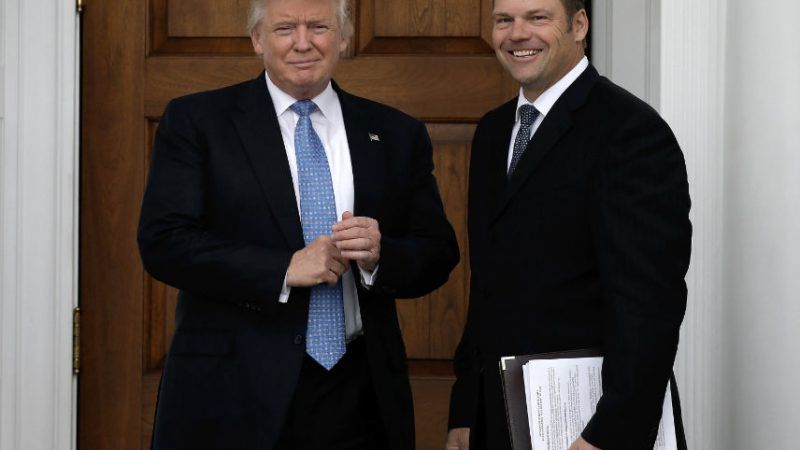Immigration Restrictionists Seek to Weaponize the Census
Kansas Secretary of State Kris Kobach would prefer to upend the Constitution's directive to apportion House seats based on total population, not voter rolls. So barring that, the author of Mitt Romney's "self-deportation" policy wants Census-takers to ask about citizenship.


Kansas Secretary of State and gubernatorial candidate Kris Kobach, arguably the country's most influential conspiracy theorist about ever-illusory illegal-immigrant voter fraud, has not let last month's dissolution of his debacle-plagued Presidential Advisory Commission on Election Integrity set back his crusade against alien non-voters. In a Breitbart News op-ed yesterday, Kobach argued that Census Bureau's decennial survey should ask forthrightly about citizenship for the first time since 1950 (a position shared by the Jeff Sessions-led Justice Department), but also that the House of Representatives break with historical precedent by excluding illegal-immigrant aliens from its post-Census reapportionment.
We'll get to the unconstitutional nature of Kobach's latter proposal down below, but first, let's address this historically ignorant claim:
There's no good reason to keep the citizenship question off the census. Nevertheless, the liberal media and liberal groups are calling the question "controversial." But the only justification they offer for keeping the federal government ignorant of how many citizens there are is their ridiculous claim that some people might be afraid to fill out the census form. It's hard to see why anyone would be afraid, when the federal government is prohibited from using census answers against anyone and when the form itself states very prominently that a person's answers "are protected by law."
It is not remotely hard to see why households containing illegal immigrants would be afraid of volunteering that information to agents of the Donald Trump-run federal government. First of all, there's the historical precedent, as pointed out by Glenn Garvin in Reason back in 1995:
Even the supposedly apolitical head counters at the U.S. Census Bureau have been unable to keep their promises not to share their most intimate data with anyone else. During World War I, the Census Bureau provided the Justice Department with names and addresses of conscription-age young men to aid in the apprehension of draft dodgers.
And in an even more infamous case, it helped carry out the internment of Japanese Americans after Pearl Harbor. Each time a roundup of Japanese was planned in a new city, Census Bureau statisticians joined the meeting. They "would lay out on a table various city blocks where the Japanese lived and they would tell me how many were living in each block," recounted Tom Clark, the Justice Department's coordinator of alien control at the time. (Clark, later a Supreme Court justice, gave his account in an oral history for the University of California.) From there it was a simple matter for the U.S. Army to conduct block-by-block sweeps until all the Japanese were safely penned up in barbed wire.
More recent Census shenanigans include "provid[ing] the Department of Homeland Security with a massive report on how many Arab Americans live in each ZIP code." That latter bit sounds similar to an effort by Kobach's Election Integrity Commission to (in the words of the Washington Post) request "Texas records that identify all voters with Hispanic surnames." Given that Trump's Immigration and Customs Enforcement (ICE) has been prowling local courthouses for aliens to deport, and threatening all jurisdictions that don't cough up immigration-status data to the feds, it is not irrational for illegal immigrants to avoid contact with any government official, let alone those from Washington asking for proof of citizenship. Kobach is on firmer ground when he points that the Census's annual American Community Survey asks about citizenship status, though that is an extrapolative sample, not a total headcount, and has a far lesser impact on government policy.
The chances of Kobach being unaware of the many disincentives for governmental cooperation are roughly zero. After all, he has been a leading national advocate against "sanctuary cities," which means he has heard earfuls of the opposing argument—that, in the 1996 words of then-New York Mayor Rudy Giuliani, sharing citizenship information with the feds will dissuade "undocumented immigrants…[from] using city services that are critical for their health and safety, and for the health and safety of the entire city." In fact, Kobach was the advisor who in 2012 helped Mitt Romney come up with the idea of "self-deportation," the whole basis of which is to make conditions for illegal immigrants so fraught and intolerable that they'd prefer to leave. (Romney's immigration stance, never forget, was once called "crazy" and "maniacal" by one Donald J. Trump.)
Since Kobach-style restrictionism is favored by the sitting U.S. president and attorney general, it's well worth taking his views seriously, as a harbinger for what might come soon. That's why his call to upend the way the House of Representatives reapportions seats after each Census is particularly instructive. Immigration hawks just do not accept the Supreme Court's clear interpretation that reapportionment be based on all residents, and so in addition to backing fruitless legal challenges, they will do whatever is in their power to produce an undercount.
The complaints about illegal immigrants unfairly tilting the composition of the House are nothing new: You can find the restrictionist Center for Immigration Studies criticizing the practice back in the 1980s, and there was a round of similar talk in 2010. Back then, National Review—no stranger to restrictionist arguments—published a Bench Memos piece by Matthew J. Franck spelling out pretty convincingly why excluding illegal immigrants and other non-voters was a constitutional non-starter. Excerpt:
After the Thirteenth Amendment's abolition of slavery rendered the "three fifths of all other Persons" a dead letter, the Fourteenth Amendment revised the census clause's language to read (in the amendment's second section) that "[r]epresentatives shall be apportioned among the several States according to their respective numbers, counting the whole number of persons in each State, excluding Indians not taxed." […]
[V]oting rights are not and never have been the relevant consideration in counting population for congressional representation. Like women in most states before the Nineteenth Amendment, and like minor children even today, the alien is counted because he is represented in Congress, even if he cannot participate in electing members of it. […]
"the whole number of persons in each State" would seem, on its face, to include everyone residing therein, illegally and legally alike. […]
[I]f the result is some advantage to states with more illegals and some disadvantage to those with fewer, the solution to the problem is to do something about our immigration crisis, not to mangle the plain meaning of the Constitution.
Since then, the Supreme Court, in a unanimous 2016 decision, endorsed the notion of adult nonvoter representation in the drawing of political districts. While Evenwel v. Abbott concerned the district-mapping within a state (Texas), not the whole country; and while SCOTUS was careful to narrow the applicability of its ruling, the majority opinion by Ruth Bader Ginsburg made it clear where the Court's sympathies continue to lie. "Nonvoters have an important stake in many policy debates—children, their parents, even their grandparents, for example, have a stake in a strong public-education system—and in receiving constituent services," she wrote. "Total population apportionment promotes equitable and effective representation."
Had Evenwel gone the other way, and should that logic have been applied nationally in a way that Kris Kobach desires, it would have a dramatic impact on the balance of power between Democrats and Republicans, a fact that has not escaped the attention of partisans on either side. "[O]f the 50 districts with the lowest share of adult citizens," RealClearPolitics elections analyst Sean Trende wrote after the Supreme Court agreed to take up the case, "82 percent are represented by Democrats, while Republicans represent 38 of the 50 districts with the highest share of adult citizens. Redistricting would probably move five or 10 House seats toward the Republicans, with proportional gains likely in the state legislatures."
As ratified by Evenwel, Trumpworld chronicler Salena Zito wrote a year ago, "those states with large numbers of illegal immigrants get extra seats (and more power to determine appropriations, electoral votes, etc.) at the expense of others. States like Michigan, Ohio, Pennsylvania." You think this hasn't attracted Donald Trump's attention?
As I wrote here a month ago, Trump's controversial pick to run the 2020 Census is Thomas Brunell, a pro-GOP academic gerrymanderer and author of the 2008 book, Redistricting and Representation: Why Competitive Elections Are Bad for America.
So: A partisan immigration restrictionist whose day-job is protecting voter integrity is advocating that the Census ask discomforting questions to illegal immigrants as an intermediate step before overhauling constitutional/historical doctrine of congressional representation; meanwhile a man whose career interest has involved partisan redrawing of electoral maps is set to be in charge of that very same Census. All while the fate of 700,000 illegal immigrants (most of them children) who volunteered their information to the federal government hangs in the balance; congressmen are calling to arrest such people on sight, and ICE's courthouse raids intensify.
It's hard to escape the conclusion that the Trump administration wants illegal immigrants and their families to be undercounted by the Census in a way that helps Republican electoral fortunes, and contributes to the fulfillment of Mitt Romney's once-"maniacal" dream of self-deportation.



Show Comments (96)